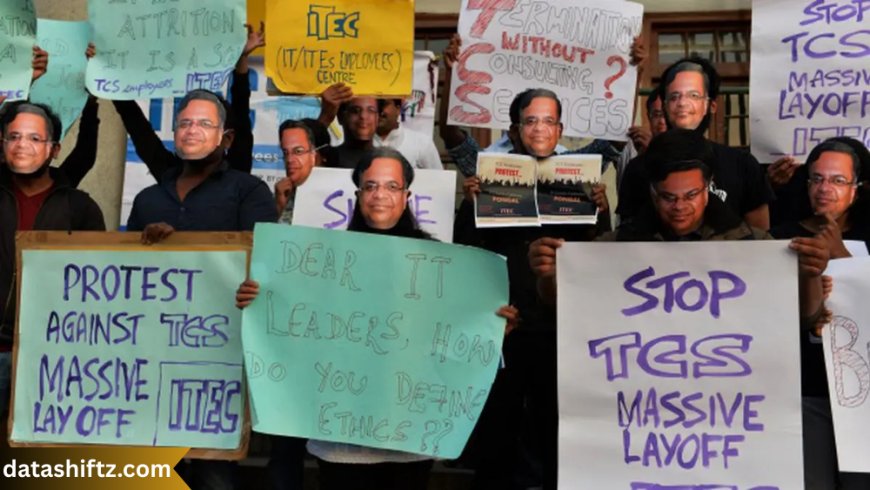TCS Layoffs & UNITE Protest: Navigating Workforce Turbulence in India’s IT Giant

Tata Consultancy Services (TCS), India’s largest IT services company, recently announced plans to reduce approximately 2% of its global workforce—impacting around 12,000 mid- and senior-level employees. The decision sparked widespread unrest, including protests led by the Union of IT & ITES Employees (UNITE) and support from the Centre of Indian Trade Unions (CITU). With union leaders claiming the potential for up to 30,000–40,000 job losses, the situation has become a flashpoint in the debate over labor rights, the impact of AI, and corporate responsibility.
Anatomy of the Layoff Announcement
Rationale Behind Workforce Reduction
TCS attributes the layoffs to global business slowdowns, AI-driven efficiencies, and skill mismatches in certain mid and senior-level roles. The company states this move is part of becoming a "future-ready" organization, emphasizing AI adoption, new global offerings, and a restructured internal model
Support Measures for Affected Employees
TCS has pledged a notice period payment, severance packages, extended insurance, outplacement assistance, and counseling for affected employees. Internal communications also mandate that employees must maintain 225 billable days per year, limiting bench time to 35 days, with associated performance and employment implications
Union Backlash & Organized Protests
UNITE-Led Demonstrations
UNITE, with backing from CITU, led protests across cities, including Chennai, decrying the layoffs as unfair and strategically targeted. According to union representatives, freshers are being hired at 80–85% lower salaries to replace experienced staff. They have also alleged that TCS’s financials are robust—with profits, dividends, and revenue at all-time highs
Legal Escalation
The Karnataka State IT/ITeS Employees Union (KITU) has filed an industrial dispute with the Karnataka labor department, seeking action under the Industrial Disputes Act. Allegations include illegal retrenchment, coercive forced resignations, and violations of required procedures
Contextual Insights & Broader Implications
AI and Sectoral Dynamics
Industry experts view TCS's layoffs as a bellwether of a broader AI-induced transformation in the ~$283 billion outsourcing sector, where automation is reshaping roles traditionally held by mid-career employees. Projections estimate 400,000–500,000 jobs could be at risk in the next 2–3 years
Impact on Employee Morale and Economic Ripple Effects
Employees report plummeting morale, especially among mid-career and senior professionals. The slowdown in IT sector hiring and growing uncertainty may also adversely affect related industries—from real estate to luxury consumption, given the wide economic multiplier of IT employment
Overview Table: Key Stakeholders & Positions
| Stakeholder | Position / Action |
|---|---|
| TCS Management | Announces 2% workforce reduction (~12,000 jobs), cites skill mismatch and AI strategy. Provides severance and transition support. |
| UNITE (union) | Claims layoffs may affect up to 30,000–40,000 employees; protests; demands reskilling, not layoffs. |
| CITU & FITE (unions) | Criticize the layoffs as profit-driven; call them unlawful; warn employees not to resign under pressure. |
| KITU (regional union) | Filed dispute with labour authorities; demands legal action under Industrial Disputes Act. |
| Industry Analysts | View layoffs as indicative of broader AI-driven disruption; warn of massive job risks. |
| Affected Employees | Express demoralization and coercion concerns; cite bench policy constraints and limited redeployment. |
Key Takeaways in List Form
-
Scale of Layoffs: TCS is cutting ~12,000 jobs (2% of workforce), targeting mid/senior-level roles.
-
Support Measures: CEO-led plan includes severance, insurance, outplacement, and notice period pay.
-
Union Resistance: UNITE and CITU stage protests; KITU files official dispute; call for reskilling over cuts.
-
Allegations of Unfair Practices: Coerced resignations, hiring juniors at reduced pay, and procedural breaches alleged.
-
Broader Technological Shift: This is emblematic of AI transforming employment in the IT sector.
-
Economic and Social Fallout: Industry slowdowns may impact employee morale, real estate, and consumer demand.
-
Policy & Regulatory Pressures: Labour departments are being drawn into the dispute due to potential violations.
Conclusion
The TCS layoffs and resulting protests underscore the fragile juncture at which India’s IT industry currently stands. Amid accelerated AI adoption and a slow hiring cycle, mid-career professionals are bearing the brunt of structural change. TCS says it's facilitating a transition with support packages; workers and unions, however, demand accountability, transparency, and safeguards via reskilling and equitable treatment.
Moving forward, the resolution of this crisis hinges on balanced dialogue, legal oversight, and practical frameworks that protect livelihoods while allowing firms to adapt to technological shifts. It remains to be seen whether this sparks broader sectoral reforms or union resurgence—one thing is clear: how this plays out could shape employer–employee relations across the tech ecosystem for years to come.






























